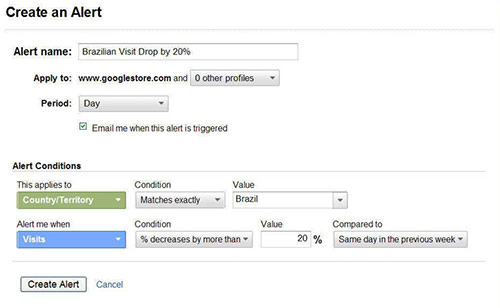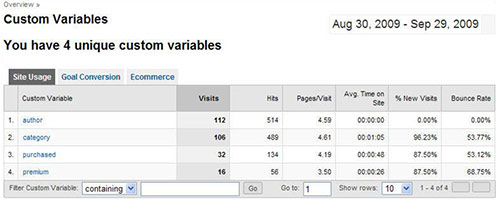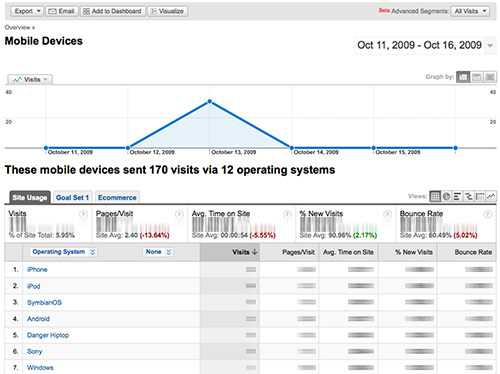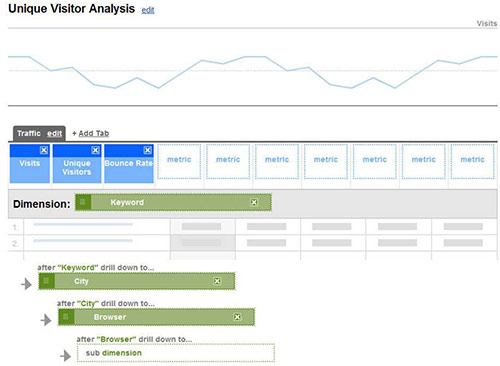Google announced at eMetrics today that it will be adding a number of new features to Google Analytics, it’s free web analytics software. With these new features this web analytics application is becoming so powerful that it is hard to understand why it is free. Let’s not ask why, but just thank Google for making such a powerful web analytics tool available for free.
The features are, in Google’s words, POWERFUL, FLEXIBLE and INTELLIGENT and we’ll be discussing them in more detail in the coming weeks as Google phases them out to all the Google Analytics accounts, giving you ideas on how to use these new features to derive actionable insights and formulate strategies supported by analytic data.

This is the initial release of an automated, algorithmic-driven intelligence engine that will let you know when significant changes have occurred in the data patterns of your site metrics and dimensions and can be configured to send you daily alerts of these changes. The initial phase will support detection across 11 dimensions and 18 metrics.

As part of the intelligence features that are being added, users will also be able to configure Custom Alerts. Add some of the key metrics you like Google Analytics to watch and set daily, weekly and monthly triggers for when Google Analytics should inform you of changes. As with Analytics Intelligence, Custom Alerts will also support alerts across 11 dimensions and 18 metrics.

This is a long desired feature here at VKI to improve upon the single User Defined Variable that currently exists in Google Analytics and will be released over the next few months. This will allow users to create multiple, unique variables to track data valuable to their business and classify visitors based on their actions, providing greater insight into visitor segments. These custom variables can be set at the page, session, and visitor-level with multiple variables being allowed to be set at one time. The initial release will have a limit of 5 simultaneous variables being set per page and will not include segment creation based on MCV.
Future posts will focus both on the technical “how to’s” and on how enhanced, custom segmentation can make for clearer report interpretation and well supported strategic decisions.
Users will now be able to configure up to 20 goals per profile compared to the previous 4 goal limit. These 20 goals will be split into 4 goal sets. This is a well appreciated feature, but is also something that could be abused by the unititiated. We will be consulting with our clients on using the new features to their best advantage.
Along with the increased number of goals, there is a new engagement goal type to help you measure conversion by the extent of visitor engagement, based on the 2 metrics Time On Site and Pages Per Visit.
I must admit I’m really excited about how these new features will provide clients with deeper, clearer insights . These include the addition of Secondary Dimensions, Pivoting, and Advanced Table Filtering and allow you to drill into your data on the fly and gain a lot of valuable insights without having to export your data out to Excel and other tools.
- Secondary Dimensions will give you the ability to view multiple levels of data in a single report rather than having to drill deeper into each level.
- Pivoting will allow you to cross-tabulate 2 metrics against 2 dimensions, pivoted by a 3rd dimension. E.g. To understand the performance of your methods to reach qualified visitors and acquire customers, you can view the Source and Visitor Type (2nd dimension) pivoted by Medium and display Revenue and Ecommerce Conversion Rate. More on this in upcoming posts.
- Advanced Filtering: Currently you can filter data, within a table, on only one dimension. There will now also be an advanced filter that gives you much more control, allowing you to filter the rows in your tables with conditions based not only on additional dimensions but also on metrics.

Mobile browers have now become more prevalent than browsers on desktops and laptops. Have you started thinking how your site is being viewed through these other devices? Google Analytics has expanded their mobile reporting to include applications built for iPhone and Android devices. In addition, Google Analytics, now includes the ability to track mobile sites from all web-enabled devices, even if those devices don’t run javascript. The initial release will include server-side code snippets for PHP, Perl, JSP, and ASPX. Check it out and keep and eye on the trend.

GA has also expanded your ability to understand your metrics at the visitor level by including the Unique Visitor metric against any dimension in your custom reports.
















